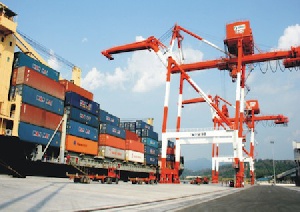The Nigerian Ports Authority has lauded the Ghana Ports and Harbours Authority for reforms it has initiated that has tremendously enhanced trade facilitation at the ports in the country.
General Manager in charge of corporate and strategic planning at the Nigerian Ports Authority, Femi Jegede, says the electronic data interchange system, the automation of the port, the electronic surveillance system and the deployment of technology in cargo handling and security among others are innovations that Nigeria would want to replicate.
According to him, though the Nigerian Ports Authority has also commenced an automation programme, the Ghana Ports and Harbours Authority was ahead of it in that regard, saying they were going to replicate some of the programmes initiated by their Ghanaian counterparts to ensure that they improve on the level of efficiency in port operations in Nigeria.
Mr. Jegede who together with several of his colleagues are on a familiarization visit to the Ghana Ports and Harbours Authority, said they were in the country to learn the Ghanaian experience and to have a first-hand knowledge of how things are done in the ports in Ghana by the Ghana Ports and Harbours Authority in particular, and explore avenues of working together for the benefit of the two countries.
He pointed out that the Nigerian Ports Authority was using the landlord port model which makes the Authority basically the regulator with the private sector employed or contracted to provide services in the ports unlike Ghana which is practicing both the landlord and the hybrid system where the Ghana Ports and Harbours Authority also provides services in the ports alongside the private sector whiles playing its supervisory role.
According to him, the two countries face similar challenges some of which have to do with manpower development and the dynamic nature of the industry which requires a frequent upgrade of skills and knowledge to compete on the global scene.
"Port operations depend on the size of the economy and if the economy is flamboyant, port operations would equally match up and soar, and this is an indication that the shipping business is dynamic in nature and requires a lot of skill and expertise to handle,’’ he posited.
He mentioned the issue of false declarations by importers as some of the challenges that confront them and contributes to the issue of congestion at the ports in Nigeria, noting that the Authority has been able to deal with the issue of congestion in Nigerian ports.
'The problem we have in Nigeria is that some importers deliberately import and leave their containers in the ports for longer periods as though the ports were warehouses,’’ he said.
Mr. Jegede said Nigeria, last year alone, handled a cargo throughput of 85 million tonnes, adding that they expect to do about a 100 million tonnes of cargo throughput this year.
Head of Marketing and Public Relations at the port of Tema, Paul Asare Ansah, who took the delegation through the workings of the port of Tema; in an interview with the M&TD, said the Port was happy with the visit of the Nigerian delegation and that it was testimony to the fact that the port was the preferred one in the sub-region.
"The Nigerian Ports Authority has been sending delegations to us to learn from us what we are doing, you know we have gone through port reforms since year 2000 and they are also in the process of undertaking the reforms; in fact the reforms have been taking place across the sub-region so we have been receiving delegations from all over who come to learn from us how we are doing it and this obviously is one of such visits’’ he noted.
Mr. Asare Ansah said the landlord port model which is being practiced in most of the countries along the sub-region is a World Bank agenda, stressing that because that was not good for Ghana, the GPHA opted for the hybrid model which is yielding very positive dividends and therefore attracting others from the sub-region who come and learn from the port Authority.
‘’We are employing the hybrid model where we participate in cargo handling, we participate in marine operations as well and we license private operators also to participate, so we compete in both vessel and cargo handling and that is what has endeared us to the other players in the sub-region who are coming to learn from us how we are doing it, because it is in the interest of the port Authorities to be sustainable to earn sufficient revenue to undertake the necessary modernization and development of our ports infrastructure,’’ Mr. Ansah added.
Click to view details



Business News of Wednesday, 17 September 2014
Source: Maritime & Transport Digest
Nigeria Ports Authority lauds GPHA for reforms
Entertainment
















